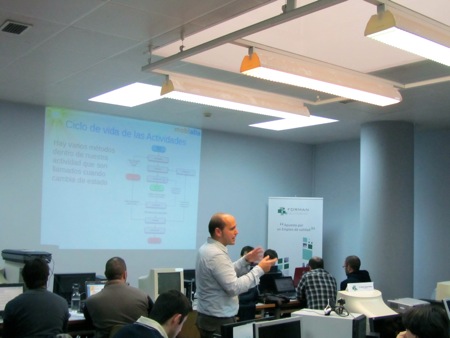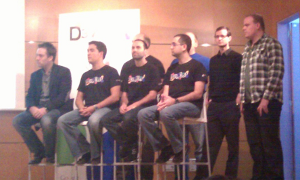A small problem with the facebook Android SDK

At Mobialia the lasts weeks I was involved on the development of a social app using , among other social networks APIs, the facebook API.
For me it was easier to implement Twitter API access using only the signpost library, for facebook they recommend to download their Android SDK, and I did so. First we need a class attribute with the Facebook object:
Facebook fb = new Facebook(appId);
The problem is during the autentication process: we must call the fb.authorize method…
fb.authorize(this, PERMISSIONS, ACTIVITY_CODE, this);
And wait for the result of this called activity on our onActivityResult method
protected void onActivityResult(int requestCode, int resultCode, Intent data) {
fb.authorizeCallback(requestCode, resultCode, data);
}
But, here is the problem, under heavy memory requierements (like testing on a old HTC Magic) the caller activity may be killed, and the status of the Facebook object is not maintained so the call to authorizeCallback is going to fail.
Then I need a method to mantain the Facebook object status, and here comes the hack. I added this method to the Facebook object:
public void setStatus(int mAuthActivityCode, DialogListener mAuthDialogListener){
this.mAuthActivityCode = mAuthActivityCode;
this.mAuthDialogListener = mAuthDialogListener;
}
And I call this method on my OnActivityResult:
protected void onActivityResult(int requestCode, int resultCode, Intent data) {
fb.setStatus(ACTIVITY_CODE, this);
fb.authorizeCallback(requestCode, resultCode, data);
}
Note that the DialogListener is the same Activity. Other solution may be to avoid killing of the caller activity, but I don’t figure how…








 At last, the first “stable” release of my chess engine. The main new features are:
At last, the first “stable” release of my chess engine. The main new features are: I’ve been using Opera Mini 4 for 1 year and I prefer it over the Symbian integrated browser because is faster, simpler and smaller. Now Opera announced the avaiability of an Opera Mini 5 Beta. The main new features are:
I’ve been using Opera Mini 4 for 1 year and I prefer it over the Symbian integrated browser because is faster, simpler and smaller. Now Opera announced the avaiability of an Opera Mini 5 Beta. The main new features are: